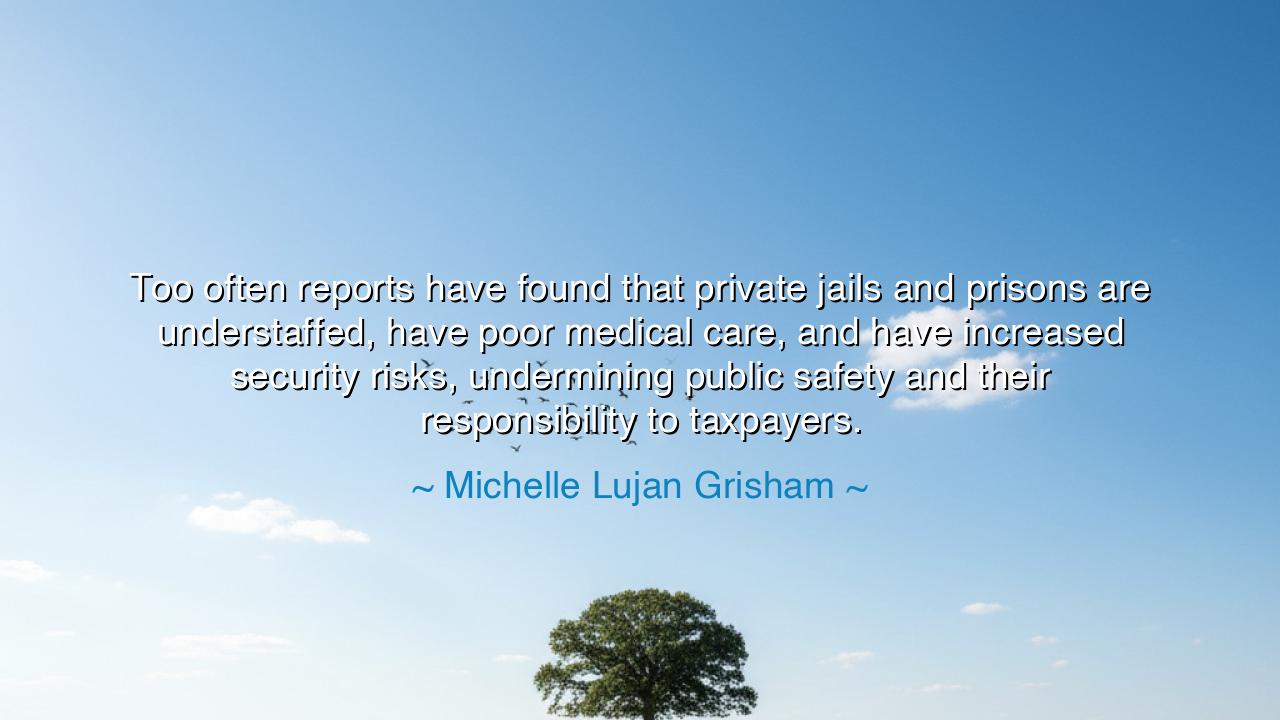
Too often reports have found that private jails and prisons are
Too often reports have found that private jails and prisons are understaffed, have poor medical care, and have increased security risks, undermining public safety and their responsibility to taxpayers.






The words of Michelle Lujan Grisham burn like a flame against the darkness of indifference: “Too often reports have found that private jails and prisons are understaffed, have poor medical care, and have increased security risks, undermining public safety and their responsibility to taxpayers.” This is not merely a statement of governance; it is a lamentation and a warning. It speaks of a sacred trust broken, of a people who have traded justice—that divine balance of mercy and order—for the coin of convenience. For when justice is bought and sold, it ceases to be justice at all; it becomes a shadow of profit clothed in iron bars.
In the ancient days, the wise understood that the health of a civilization is known not by its wealth, nor its monuments, but by how it treats those it confines. The Athenians, who once boasted of democracy, fell into tyranny when they forgot that prisoners too are human. The Romans, whose legions conquered the world, decayed from within when cruelty became entertainment and punishment became spectacle. So too, in our age, the chains have changed, but the peril remains. When private prisons thrive on the suffering of men, they feed upon the soul of the republic itself.
The governor’s words call us to remember that a prison is not merely a place of walls and watchtowers, but a mirror held up to the conscience of a nation. Understaffed institutions breed despair and disorder. Poor medical care mocks the sanctity of life. Security risks endanger not only the guards and the confined but the communities beyond the gates. Each neglected life behind those bars sends ripples outward, eroding the foundations of public safety that we claim to defend. To wound justice is to wound ourselves.
Think upon the tale of Andersonville Prison during the American Civil War—a place where neglect, hunger, and disease took more lives than bullets. It was not hatred alone that killed those men, but the abandonment of duty, the belief that some lives mattered less. From that horror, the nation learned—too late—that the cost of neglect is always higher than the cost of compassion. And yet, generations later, the lesson seems forgotten. When we allow corporations to profit from imprisonment, we risk repeating the sins of history, chaining our morals to the weight of gold.
Grisham’s rebuke is thus both moral and civic. To the citizen, she says: remember that taxpayers are not merely financiers, but participants in justice. The money of the people is sacred, and when it is spent to degrade rather than to restore, we are all diminished. The jailer and the jailed are bound together by the invisible threads of law, and when one is corrupted, both suffer. Public institutions must serve the public good, not private greed. This is not politics—it is principle, older than nations, written in the laws of conscience.
There is, however, a path forward. The ancients taught that the cure for corruption is not punishment but restoration. Reform, not revenge; redemption, not profit. Let prisons become again what they were meant to be—places of correction, not cages of despair. Let the people demand transparency, demand care, demand that every soul behind those walls be treated with the dignity owed to humanity itself. For when we heal the broken, we fortify the nation.
And so, to you who listen, I say: guard the temple of justice. Do not allow it to fall into the hands of merchants who see only numbers where hearts should be. Stand watch as the old prophets did, calling out when truth is traded for convenience. Support leaders who place humanity before profit, who understand that freedom and fairness are not commodities but covenants.
For the strength of a people is not measured by how high their walls stand, but by how deeply their compassion runs. A just society does not forget its prisoners—it remembers that they, too, are its children.






AAdministratorAdministrator
Welcome, honored guests. Please leave a comment, we will respond soon